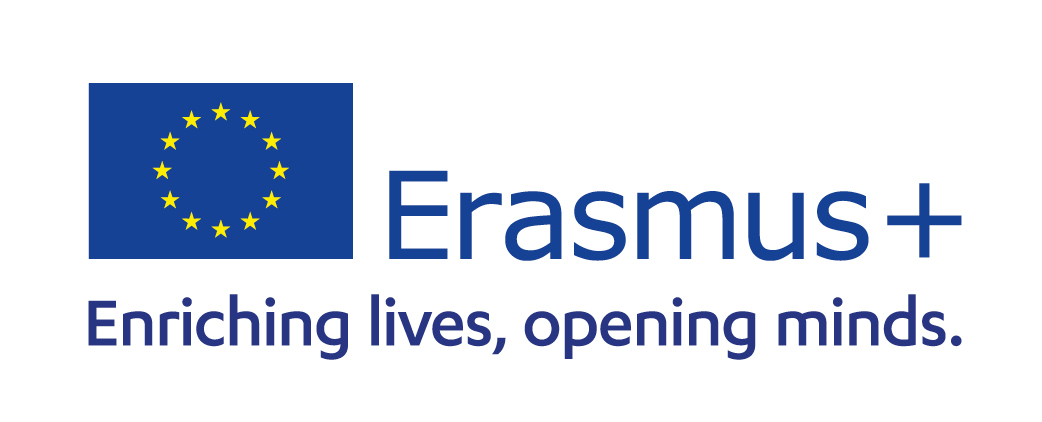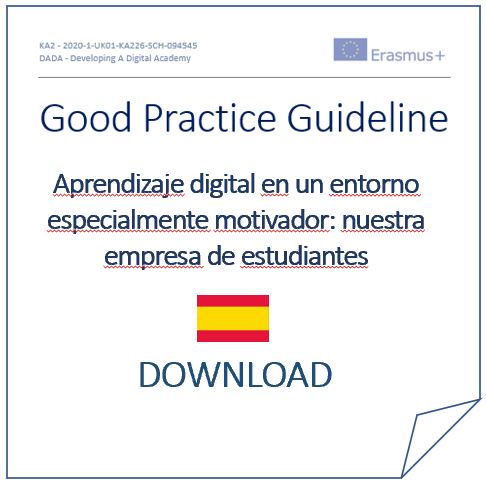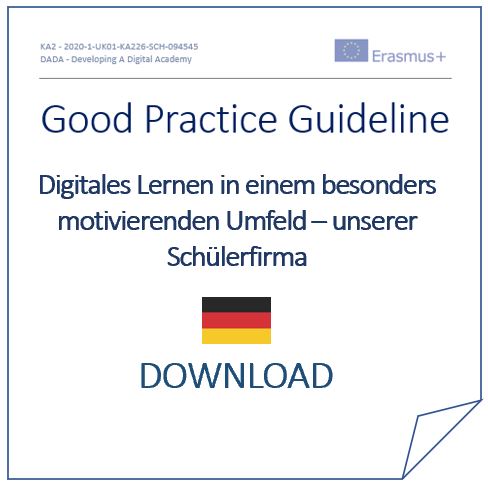DADA
DEVELOPING A DIGITAL ACADEMY
Implementation Concept For Digital Learning
Digital learning in a particularly motivating setting - our student company
INDEX
Real learning occasions with a real-life character
How can a student company promote digital competences?
Additional valuable learning objectives that can be achieved with a student company
How do you start a student company?
Didactic guide for planning a student company
Preparation Organisational preparation
Real learning occasions with a real-life character
Real learning occasions with a real-life character can be very motivating as they link learning with practical application and let learners apply the knowledge in a real context.
When learners know that they will have to apply the knowledge they have learned in a real situation, they will usually be more motivated to make an effort and internalise the knowledge better. This is because learners can directly see the impact of their actions and understand the need to master the knowledge.
Examples of learning occasions with a serious character are simulations, role plays, business games or even real problems in the working world. In these situations, learners can test their skills and knowledge and apply their knowledge in a practical environment.
By combining learning and practical application, learners can also develop a deeper understanding of the subject and remember it better. Therefore, integrating learning events of a serious nature into curricula or training can be an effective way of enhancing learners' learning and motivation.
The Kunigundenschule in Lauf an der Pegnitz and the Johann-Daniel-Preisslerschule have therefore decided to create a particularly motivating learning occasion by setting up a student company as part of the project.
How can a student company promote digital competences?
A student company can promote digital competences in different ways, e.g.:
Project management tools:
Student companies can use digital project management tools such as Trello or Asana to plan, organise and manage tasks and projects. This helps students learn important skills such as time management, prioritisation and teamwork.
Social media management:
A student company can promote digital skills by presenting itself on social media such as Facebook, Instagram or Twitter and promoting its products or services. Students can learn how to develop a social media strategy, create and publish content, and maintain interactions with customers and followers.
Web design and programming:
If the student company has its own website, students can learn how to create, design and manage a website. This can include programming skills, HTML and CSS skills, and design skills.
Online marketing:
A student company can promote digital competences by using different online marketing techniques, e.g. search engine optimisation (SEO), Google Ads or email marketing. Students can learn how to plan, create and optimise online marketing campaigns.
Data analysis:
If the student company collects data about its customers or its products, students can learn how to analyse and interpret data. This can include how to visualise data, how to do trend analysis and how to make decisions based on data.
Creative writing:
A student company can encourage students to practice creative writing by creating blog posts or social media content. This can help them improve their writing skills and learn effective communication techniques.
By promoting digital competences in different areas, student companies can teach students important skills that are increasingly important in today's digital world.
Additional valuable learning objectives that can be achieved with a student company
A student company also provides students with hands-on experience in the business world and promotes many valuable learning objectives. Here are some reasons why a student company is so valuable for learning, in addition to the many opportunities for digital learning:
Practical experience:
A student company allows students to gain practical experience in the business world. They learn how a business works, how to make decisions, how to communicate with customers and suppliers, and how to manage finances.
Problem-solving skills:
A student enterprise requires students to solve problems and make decisions to make the enterprise successful. This develops their ability to think creatively and analytically and to solve problems in an effective and efficient way.
Teamwork:
A student enterprise requires students to work together to achieve common goals. This fosters their ability to work effectively in a team, communicate, resolve conflicts and share responsibilities.
Entrepreneurial skills:
A student enterprise requires students to develop entrepreneurial skills, such as the ability to identify opportunities, take risks and innovate. These skills are invaluable not only for future entrepreneurs but also for leaders in all industries.
Sense of responsibility:
A student enterprise requires students to take responsibility for their decisions and actions and understand the impact of their choices. This fosters their sense of responsibility and their ability to make responsible choices in their personal and professional lives.
Overall, a student company provides students with a valuable experience in the business world and develops many important skills that will be useful to them later in life.
How do you start a student company?
Starting a student company can be an exciting and educational experience for students. Here are some steps that can be followed to start a student company:
Develop idea:
The first task is to develop a business idea. This could be selling products or services, for example. It is important that the idea is realistic and feasible.
Form a team:
A student company needs a team of students to work on the idea and run the business. The strengths and skills of each member should be considered.
Create a business plan:
A business plan is an important tool to concretise and implement the idea. This plan should outline goals, financing, market analysis and other important aspects of the business.
Clarify legal issues:
In the case of student companies, legally relevant problems and questions are both learning and procedural issues and need to be clarified by all parties involved before the start-up as well as during the active existence of the student company.
Obtaining information and purchasing materials:
The pupils inform themselves about different sources of supply for necessary material or goods. Information and purchasing often take place outside of regular class time and outside of school.
Own safety and liability:
Pupils handle technical equipment and tools in the school's craft room and kitchen, on the school grounds, occasionally also in a commercial workshop. When carrying out many necessary activities outside the school area, no teacher or other supervising person is present. Pupils leave the school premises during lesson time or do their chores in the afternoon, e.g. at the bank, in the DIY store, in workshops, in shops, and many more.
Crimes
If a complaint is made against a pupil for theft, it is a legal matter between the police and the parents. Educational and disciplinary measures are taken by the school. Product safety and liability: Preparation, production and sale of goods or provision of services can take place at school, but also at another location, e.g. in the town hall, at a trade fair, in a furniture store or similar.
Tax liability
As a rule, taxation of possible turnover and profits can be avoided as far as possible. However, it is important to pay close attention to the respective state laws in this regard. Ask at your school authority, they have the necessary expert knowledge and can provide information.
Secure funding:
Financial resources are needed to set up and run the student company. These can be raised through equity, funding programmes or sponsors.
Start business operations:
As soon as the student company is founded and financed, the business activity can be started. It is important that the pupils manage the business responsibly and professionally.
Measure and increase success:
A student company should regularly measure and evaluate its performance in order to make improvements and increase success.
These steps can help to create a successful student company. It is important that students are engaged and motivated in the process to run the business successfully.
Didactic guide for planning a student company
Preparation Organisational preparation
- Make appointments at the teachers' conference, the grade level conference, with the school administration.
- Inform parents (parents' evening, parents' letter) - Check insurance cover, organise if necessary (for the whole year)
- Specific cooperation agreements with colleagues and subject colleagues
- Preparation for lessons
- Exercises to train effective group work
- What is a market? - Product idea/market analysis/product decision
- What are the market rules for our product?
- What are the production processes and working techniques?
- How do we plan the project process up to purchasing? (Project plan)
- Legal framework for buying and selling
- Which group takes on which tasks? (Group division)
- Carrying out price comparisons - Drawing up a financing plan - Interview technique and expert surveys on various topics
Implementation
- Purchase of the necessary material
- Preparation and implementation of flow production (production)
- Preparation and implementation of advertising
- Preparation and implementation of sales
Follow-up
- Letter of thanks to supporting partners (companies, institutions, experts)
- Presentation of the result (profit/loss) by the "Finance" team
- Reflection of the individual teams on their work in the form of presentations
- Evaluation of the course of the project including possibilities for improvement



